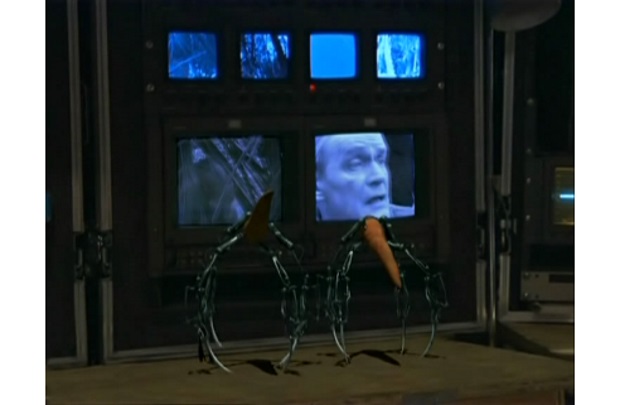What Made Lexx Such a Great Cult Sci-Fi Series?
We journey into the Dark Zone to rediscover what made this Canadian cult classic such a fan favourite…
This article comes from Den of Geek UK.
Some sci-fi fans, it’s fair to say, face more of an uphill struggle than others when it comes to explaining the merits of a series they love. For Doctor Who enthusiasts, it’s battling against the preconception that the classic era stuff can’t be any good because the sets are wobbly. Try to extol the virtues of Ghost In The Shell and there’ll always be someone who scoffs at the idea of sitting down to watch a cartoon. And Lexx? That’s the pervy one they used to show late at night, right? With the Germans in silly wigs and giant moths and a spaceship shaped like a-
Well… yes. Spreading the word about Lexx wasn’t easy, mostly because the show quite often genuinely was a raunchy, innuendo-laden romp, one whose look and feel evoked the type of content Channel 5 in the UK used to be infamous for peddling after-hours. Small wonder, then, so many people dismissed it as a campy curiosity they’d stumbled on accidentally during some post-pub channel surfing.
Read the latest Den of Geek Special Edition Magazine Here!
Lexx was the first commercial success from the Canadian studio Salter Street Films, taking the form of four darkly comic TV movies known collectively as Tales From A Parallel Universe. The show’s premise – a crew of misfits and criminals aboard a living ship, on the run from an evil empire – was often compared to its contemporary Farscape, but while Lexx was never as well-known in the States its popularity in Europe did at least secure the funding for an episodic series.
Despite its late-night timeslot and relative obscurity the show amassed a ferociously loyal fandom, mostly established online, and by the time series three was picked up by the Sci-Fi Channel there were any number of webrings and tribute sites, not to mention a Lexx convention to look back on. Clearly, there was something more to the series than skimpy outfits and smutty set designs. What, then, was it that gave Lexx its appeal?
No more heroes

Plenty of sci-fi shows nowadays claim to have layered, troubled characters; anti-heroes with a dark past who need to atone for their mistakes or somehow wash away the trauma that mires them before they can achieve their full potential. Very few choose to proudly declare that their protagonists are a bunch of self-absorbed jerks with hardly any positive personality traits, and that’s the way they likes it, see? In a genre jam-packed with noble champions it’s especially refreshing to follow a group who’ll happily lie, cheat and threaten the rest of the universe to get what they want, even if it normally backfires in the end.
The secondary motivation for almost everyone on board the Lexx is saving their own skins from those who want to steal the ship for themselves. Their primary motivation is sex. There’s Stanley Tweedle, an amoral security guard – and holder of the only key to the Lexx – who wants to find a nice planet where the female inhabitants aren’t put off by his ineptitude and general cowardice. His partner-in-crime is Xev, a former prisoner with the body of a Love Slave and some predatory lizard DNA thrown into the mix, who desperately wants to test-drive her enhanced libido with anyone but Stan. Having grown up in a box, Xev can be both hot-headed and naïve, but isn’t above playing Stanley to get her way – often getting the pair of them into trouble as a result.
Then there’s Kai, the reanimated corpse of an ancient warrior who’s spent the last two thousand years working as an assassin for the baddies, who’s arguably the most heroic and courageous of the crew – except, as he’s constantly reminding everyone, being dead means he has no particular motivation to do good deeds. Rounding out the crew is 790, a disembodied robot head who winds up obsessively, murderously smitten with Xev. (He’s also, depending on your point of view, either comic relief or one of the most insufferable characters in all of science-fiction.) Finally we have the Lexx itself, an amiable, slow-witted superweapon capable of devouring, or simply destroying, whole planets.
As unsympathetic as these characters are, there’s enough nuance in their portrayal that it’s hard to dislike them for long. As we learn about Stan’s tragic backstory and watch Xev coming to terms with just how much of her life was taken from her, we begin to feel for this bunch of losers who just can’t seem catch a break. That is, until the planet they’re visiting that week invariably gets destroyed and they simply sail on to their next destination with little more than an apologetic shrug. The jerks.
Laying down the lore

Each of Lexx’s four seasons varied wildly in length and format. The four loosely-connected movies that made up the original run were supplanted by an episodic format that mimicked Buffy: a series of standalone adventures which finally gave way to a reckoning with that season’s Big Bad, Mantrid. The show’s third season was markedly slower and more thoughtful, plunging the crew of the Lexx into a heavily-serialised arc that focused on the mystery of two warring planets, Fire and Water. Its fourth, by contrast, returned to more stand-alone adventures set on present-day Earth.
And yet, despite regular sweeping changes in its approach to storytelling, Lexx displayed a remarkable dedication to consistency, making sure that the characters couldn’t do anything this week that had been impossible the week before. The show’s twisted chronology was meticulously adhered to, and even throwaway gags like the Moth-Builders (lobotomized drones responsible for replenishing the show’s shuttlecraft substitutes) gradually got worked into the mythos of the show.
The showrunners knew their audience, and almost always took the time to answer those “Why don’t they just…” questions fans find within any narrative. This became especially important in the show’s later seasons as favourite guest actors began to return in new guises – imagine Star Trek taking the time to explain why so many aliens look like Jeffrey Combs – and helped elevate the show for anyone who’s a fan of coherent sci-fi worlds. In a series filled with singing brains, outer-space zombies and kaiju-sized women destroying Tokyo, it’s both remarkable and brilliant that they bothered.
Lexxperimentation

Apologies, but if you write a Lexx article and don’t use at least one pun in a sub-heading they actually send you to prison. Regardless, there were several points in the show’s run where the writers decided to break away from the linear storytelling that usually dominated the series. The most notable of these is almost certainly Brigadoom, a beloved musical episode that aired long before Buffy and Supergirl got in on the act. It’s no Hamilton, the tunes largely being appropriated from German nursery songs, but finally diving deep into Kai’s backstory made the episode a firm favorite among fans.
Brigadoom came hot on the heels of what could only notionally be described as a two-parter: the far less popular pairing of The Web and The Net. The premise here is an intriguing one – in The Web, the Lexx is stopped dead in space, and the crew begin to act strangely while tension and paranoia mount. Only in The Net do we get to see scenes outside the characters’ perspectives, revealing the true nature of the problem – the Lexx has been snared by alien spiders who are possessing the crew. Unfortunately, the clumsy way in which the first loop ends without a resolution, and the relative lack of new footage the following week, left the audience distinctly unimpressed.
Far more successful was The Game, a late fourth season take on The Seventh Seal that sees Kai battling to regain his life and mortality. The living chess pieces are played by the main cast, and they gleefully and spitefully hurl insults at one another from across the board, passing commentary on the match as it plays out. Even if you’re not familiar with chess, it’s grippingly paced and beautifully shot on a landscape that transitions from black to white and back again depending who’s got the upper hand. Experimental outings like this were few and far between, but when they worked, they helped raise the profile of the show as a whole. When they didn’t… well, they still weren’t as offensive as the gender-swapping episode. Very little could be.
Toilet humor

If you’re looking for a way to describe Lexx’s sense of humour, “broad” would probably be one of the most tactful. The show’s move to episodic format allowed Salter Street to cut loose with mockery and satire, a lot of it being directed against America with the same bluntness as a show like South Park.
We visit the patriotic planet Potatoho, encounter incestuous redneck escapees and, eventually, watch the craven President of the United States nuke Canada in a fit of pique. (A wholly unbelievable development in this day and age, of course…) There’s plenty of room for parodies, too, whether it’s riffing on other sci-fi like Aliens or casting a wider net to movies like Apocalypse Now or even The Wizard Of Oz.
Other episodes are simply silly, seemingly content devoting run-time to Kai playing the piano alongside Father Ted’s Frank Kelly, or having Red Dwarf’s Craig Charles brutally murdered by a carrot-shaped alien probe in ways only a carrot could manage. And, of course, there’s the bawdy schoolboy humour that gave Lexx its reputation in the first place. From phallic food dispensers to 790’s ‘love poems’, the show wears its heart on its sleeve when it comes to indulging the writers’ love of low-brow comedy.
Nowhere is this more evident than a scene in the Lexx’s bathroom; a chamber filled with living latrines with large, slurpy tongues and no sense of personal space. Good guys and bad guys alike – even the enigmatic Prince, whose role is effectively that of the Devil – are forced to drop their drawers and deliver in the hunt for another of the carrot probes, staring mournfully down a fish-eye lens in a moment few other sci-fi series would ever dream of portraying. All except Kai, of course. As he stoically informs his shipmates, “The dead… do not poo.”
Not exactly high-concept sci-fi, but damned if we didn’t laugh anyway. For better or worse, Lexx really was one of a kind – and that’s why we loved it.
